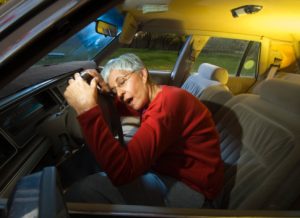 When it comes to medicine, we know not to take a drug that causes drowsiness during the day or before driving. The best example of this is medication for the common cold, conveniently divided into pills for the day (keeping your symptoms at bay without making you drowsy) and pills for the night (intended to put you to sleep). But here’s the thing: while we’re careful not to get behind the wheel when we take medicine or drink alcohol, we often dismiss the most common cause of inattentiveness, drowsiness, and fatigue—a lack of sleep.
When it comes to medicine, we know not to take a drug that causes drowsiness during the day or before driving. The best example of this is medication for the common cold, conveniently divided into pills for the day (keeping your symptoms at bay without making you drowsy) and pills for the night (intended to put you to sleep). But here’s the thing: while we’re careful not to get behind the wheel when we take medicine or drink alcohol, we often dismiss the most common cause of inattentiveness, drowsiness, and fatigue—a lack of sleep.
While we think that the greatest challenge after a sleepless night is to get out of bed—and once we’re up we’re good to go—the repercussions of pulling an all-nighter extend beyond the regular morning struggles. Sleeplessness and the resulting fatigue affect your reaction time and judgment, mess with your short-term memory, and make you more aggressive and moody. With hundreds and thousands of crashes being caused by tired drivers annually, you want to make sure you’re well-rested before you hit the road. Here are a few tips to stay safe and avoid drowsiness while driving.
Tips to avoid falling asleep on the road
Advertisement
Get a good night’s rest: Some people require more, some people require less. Just make sure you aim for those seven to eight hours every night, especially the night before a long driving trip.
Don’t rush: You may be tempted to drive through the night to get to your destination earlier, but spending your night asleep is the best thing you can do to keep yourself safe and healthy. Avoid driving during the time that you’re usually in bed.
Avoid driving alone: If it’s a long-distance journey, make sure you are driving with someone to keep you alert while you’re behind the wheel and take turns driving so that you can take a nap.
Take a breather every two hours: Change drivers, have a snack, go for a walk—you need to wake yourself up from the monotony of the road.
Avoid alcohol and drowsiness-inducing medications: If you have been drinking or if you have to take medicine that makes you sleepy, it’s best to delay your departure or ask a relative or friend to drive you.
Take a nap: If you end up feeling drowsy behind the wheel, find a pit stop, park your vehicle, get to the back seat, and take a 20-minute nap. Beware of the grogginess upon awakening.
Drink coffee: This is a short-lived solution, but if you need to finish your drive, a cup or two of coffee can make you more alert for a few hours. (Siberian secret refuels your energy from within.)
Advertisement
According to a study conducted by the AAA Foundation for Traffic Safety, people who sleep just six to seven hours a night have double the risk of getting into a sleep-related crash compared to people who sleep eight hours or more. The likelihood of an accident increases four to five times for those who get less than five hours of shuteye. As you can see, the less you sleep, the higher the risk.
Our busy lifestyles often involve driving around for extensive periods of time. Unfortunately, road accidents aren’t completely unavoidable, but by getting enough sleep every night and following the tips above, you can make your commute more enjoyable and safe.
Related: Shift work sleep disorder: Sleep and the night shift
